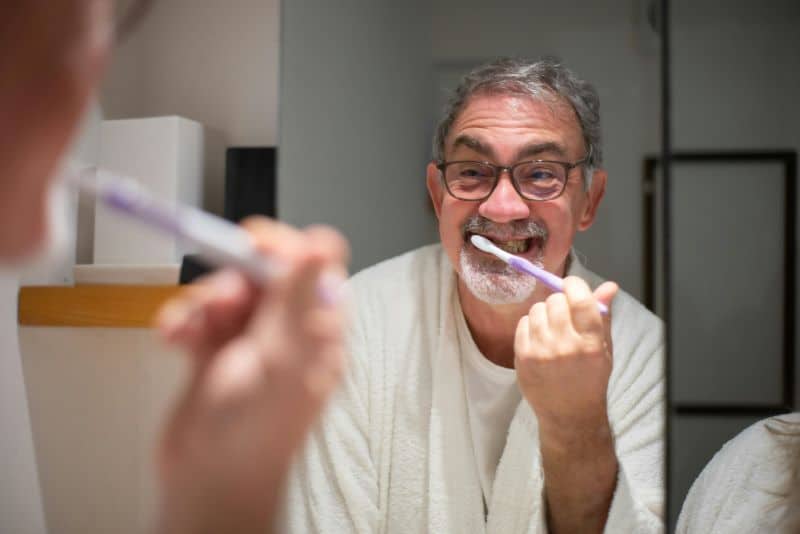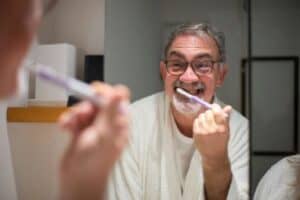
27 Jun Oral Hygiene for Seniors: Adapting Your Routine as You Age
Oral Hygiene for Seniors: Adapting Your Routine as You Age
Maintaining oral hygiene is crucial at any age, but it becomes increasingly important as we grow older. Oral health significantly impacts overall well-being, affecting nutrition, self-esteem, and quality of life. Aging brings about various physiological changes that can challenge oral health, making it essential for seniors to adapt their oral hygiene routines to meet these new needs. This comprehensive guide explores the significance of oral hygiene for seniors, the common oral health issues they face, and the best practices for maintaining a healthy mouth in the golden years.
The Aging Process and Oral Health
Aging naturally affects oral health through various physiological changes. As we age, the body undergoes transformations that can impact the teeth, gums, and overall oral cavity. These changes include reduced saliva production, which can lead to dry mouth, and a decrease in bone density, which can affect tooth stability. Additionally, seniors often experience a decline in immune function, making them more susceptible to infections, including periodontal disease. Understanding these changes is the first step in adapting oral hygiene practices to better cater to the needs of the elderly.
Types and Categories of Oral Health Issues
Dental Caries and Tooth Decay
Dental caries, or tooth decay, remains a prevalent issue among seniors. The risk of cavities increases due to factors like receding gums, which expose the softer root surfaces to decay-causing bacteria. Seniors often experience a higher incidence of root caries compared to younger individuals.
Gum Diseases (Gingivitis and Periodontitis)
Gingivitis and periodontitis are common gum diseases that can lead to severe oral health problems if left untreated. Gingivitis is the inflammation of the gums, often caused by plaque buildup. If it progresses to periodontitis, it can result in the destruction of the supporting structures of the teeth, leading to tooth loss.
Dry Mouth (Xerostomia)
Dry mouth, or xerostomia, is a frequent complaint among older adults. It can be caused by various medications, systemic diseases, or natural aging. A lack of adequate saliva can lead to difficulties in chewing, swallowing, and increased susceptibility to tooth decay and gum disease.
Oral Cancer
The risk of oral cancer increases with age. Early detection and treatment are crucial for a positive outcome. Regular dental check-ups that include oral cancer screenings are essential for early diagnosis and effective treatment.
Tooth Loss
Tooth loss is not an inevitable part of aging, but it is common due to factors like untreated decay, gum disease, or trauma. Tooth loss can significantly impact nutrition and self-esteem, highlighting the importance of preventive care.
Denture-Related Problems
Many seniors rely on dentures, which require proper care to prevent issues such as infections, irritation, and improper fit. Regular dental visits are essential to ensure that dentures are fitting well and not causing harm to the oral tissues.

Symptoms and Signs of Oral Health Issues
Pain and Discomfort
Persistent pain and discomfort in the mouth can indicate various oral health issues, from tooth decay to gum disease. Seniors should not ignore any form of oral pain and seek professional advice promptly.
Bleeding Gums
Bleeding gums are a common sign of gum disease. While occasional bleeding might be caused by aggressive brushing, frequent or unexplained bleeding warrants a dental consultation.
Persistent Bad Breath
Chronic bad breath can be a sign of poor oral hygiene, gum disease, or dry mouth. Identifying the underlying cause is essential for appropriate treatment.
Dryness in the Mouth
A dry mouth can lead to various complications, including difficulty in speaking, eating, and an increased risk of dental caries. Addressing the causes and managing symptoms is vital for comfort and health.
Sores and Lumps in the Mouth
Unusual sores, lumps, or areas of discoloration in the mouth should be evaluated by a dentist promptly, as they could indicate infections or oral cancer.
Difficulty in Chewing and Swallowing
Problems with chewing and swallowing can result from dry mouth, tooth loss, or ill-fitting dentures. Ensuring that the oral cavity is healthy and functional is crucial for proper nutrition.

Causes and Risk Factors
Poor Oral Hygiene Practices
Inadequate brushing and flossing can lead to plaque buildup, tooth decay, and gum disease. Seniors should be diligent in their daily oral hygiene routines to prevent these issues.
Systemic Diseases
Conditions like diabetes and cardiovascular diseases can have a significant impact on oral health. These systemic diseases can exacerbate gum disease and other oral health problems.
Medications Causing Dry Mouth
Many medications prescribed to seniors can cause dry mouth as a side effect. Identifying and managing this condition is crucial for maintaining oral health.
Smoking and Alcohol Consumption
Both smoking and excessive alcohol consumption are major risk factors for oral health issues, including gum disease and oral cancer. Quitting these habits can dramatically improve oral and overall health.
Nutritional Deficiencies
A balanced diet is essential for maintaining healthy teeth and gums. Nutritional deficiencies, particularly in calcium and vitamins, can lead to weakened oral structures and increased susceptibility to disease.
Treatment Options
Professional Dental Cleaning
Regular professional cleanings remove plaque and tartar buildup, preventing gum disease and tooth decay.
Dental Fillings and Restorations
For cavities and damaged teeth, fillings and other restorative treatments are essential to restore function and prevent further decay.
Treatments for Gum Disease
Treatment options for gum disease include scaling and root planning, medications, and surgical interventions, depending on the severity of the condition.
Managing Dry Mouth
Managing dry mouth involves using saliva substitutes, staying hydrated, and possibly adjusting medications under medical supervision.
Tooth Replacements (Dentures, Implants)
Replacing missing teeth with dentures or dental implants helps restore function and aesthetics, improving overall quality of life.
Oral Cancer Treatments
Treatments for oral cancer may include surgery, radiation therapy, and chemotherapy. Early detection is key to successful outcomes.
Preventive Measures

Daily Oral Hygiene Practices
Seniors should brush at least twice a day with fluoride toothpaste and floss daily to remove plaque and prevent tooth decay and gum disease.
Healthy Diet and Hydration
A balanced diet rich in fruits, vegetables, and dairy products supports oral health. Staying hydrated helps maintain adequate saliva production.
Regular Dental Visits
Frequent dental check-ups and cleanings are vital for early detection and prevention of oral health problems.
Use of Fluoride Products
Fluoride strengthens tooth enamel and helps prevent cavities. Seniors should use fluoride toothpaste and may benefit from fluoride treatments at the dentist’s office.
Avoiding Tobacco and Excessive Alcohol
Quitting smoking and limiting alcohol intake can significantly reduce the risk of oral health issues, including gum disease and oral cancer.
Managing Chronic Health Conditions
Proper management of chronic conditions like diabetes is crucial for maintaining good oral health, as these conditions can exacerbate oral problems.
Adapting Oral Hygiene Routines for Seniors
Tailoring Dental Care for Limited Mobility
Seniors with limited mobility may need adaptive devices like electric toothbrushes or floss holders to maintain their oral hygiene.
Choosing the Right Dental Products
Products designed for sensitive gums and dry mouth can enhance comfort and effectiveness in seniors’ oral care routines.
Techniques for Effective Brushing and Flossing
Proper techniques, such as using a soft-bristled brush and gentle circular motions, can help prevent damage to the gums and teeth.
Special Care for Dentures
Dentures should be cleaned daily and handled with care to avoid damage. Regular dental visits are essential to ensure a proper fit.
Hydration and Saliva Substitutes
Staying well-hydrated and using saliva substitutes can help manage dry mouth, enhancing comfort and oral health.
In Conclusion
Maintaining good oral hygiene is vital for seniors to ensure their overall health and quality of life. By understanding the specific needs of aging oral health, seniors can adapt their routines and seek appropriate care to prevent and manage oral health issues. Regular dental visits, a healthy diet, and diligent daily care are essential components of a comprehensive oral health strategy for seniors. Encouraging seniors to stay proactive in their oral hygiene practices will help them enjoy a healthier, more comfortable, and fulfilling life.


Sorry, the comment form is closed at this time.